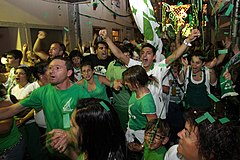Póvoa de Varzim Holiday
| Municipal Holiday of Póvoa de Varzim Feriado Municipal da Póvoa de Varzim |
|
|---|---|

Saint Peter Festival in Bairro Sul supporting their Rusga
|
|
| Also called | Saint Peter Festivals, Festas de São Pedro |
| Observed by |
|
| Type | Ethnographic, midsummer |
| Celebrations | Parades (Rusgas), competitions, bonfires, fireworks, feasting, drinking, raves, procession, decorations, national dress, sports, military parade |
| Date | June 29 |
| Next time | 29 June 2017 |
| Frequency | annual |
Póvoa de Varzim Holiday, Saint Peter Festivals (Festas de São Pedro) or Saint Peter Night (Noite de São Pedro) is celebrated annually on June 29, Saint Peter's Day in Póvoa de Varzim, Portugal. It is a late midsummer festival and the last of the three Portuguese popular saints — Santos Populares. It is celebrated with the lighting of bonfires, dances, competitions between quarters and diverse parties. Saint Peter festival includes the "rusgas", in which inhabitants of one quarter (bairro) visit in a parade other quarters in the evening of June 28. Women are dressed as tricana poveira (women dressed in a traditional costume with a sensual walking style). Each neighborhood has its own festival, neighborhood colors and altar to Saint Peter.
Traditionally, people often eat grilled sardines with bread, caldo verde, and wine in the streets, with a bonfire nearby where people gather to celebrate. In the 21st century, younger population, although participating strongly in this festival, adopted new ways to celebrate it, such as the very popular Saint Peter raves in the waterfront, in Carvalhido and in Largo Caetano de Oliveira.
Saint Peter Festival was most popular before the 1892 shipwreck. The shipwreck had a significant impact in the community and the use of the Branqueta traditional garments was also affected, as the Branqueta was associated with festivities. The community saw no reasons for further celebrations. Before 1962, Saint Peter Festival was a minor festival, major midsummer celebrations occurred during St. John's day. The local municipal holiday was celebrated on August 15, the Feast of the Assumption, the patron saint of Povoan Fishermen, but the local holiday became a national one.
The town hall decided to change the local holiday. Two options were presented: Saint Peter Festival, honouring the fishermen's saint, given the fact Póvoa was a traditional fisher town and Anjo Festival, an Easter Monday celebration, a remnant of Pagan festivities and quite popular amongst the population. Due to the fact that Easter Monday was already observed as a national holiday in Portugal in the 1960s, the generalized view was that Saint Peter Festival should be the local holiday and that was confirmed by pools in local newspapers at the time.
All the traditional midsummer elements were kept, such as the bonfire, the celebrations occur in the streets and competition between quarters started to occur, this was important as there was a traditional rivalry which started in the 19th century between Bairro Norte and Bairro Sul, two distinct fishermen quarters. And the rivalry between these quarters fueled the competition between different parts of the city, which organized themselves into distinct associations.
...
Wikipedia
